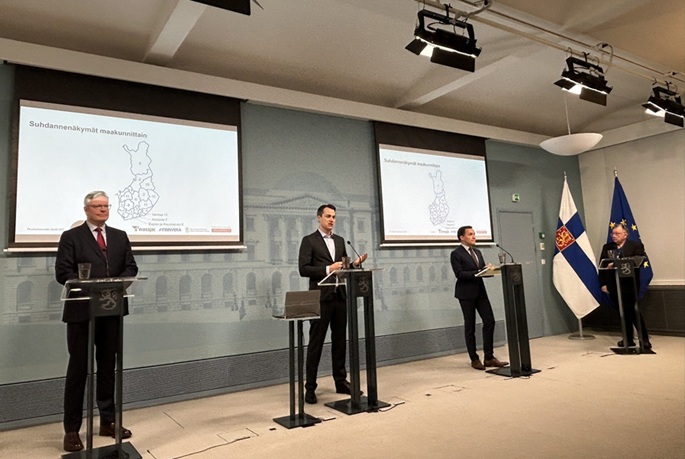SMEs outlook shows modest recovery, use of AI rises
Published : 11 Feb 2025, 23:38
The economic expectations of small and medium-sized enterprises (SMEs) have remained largely unchanged since last autumn, but they show some improvement from a year ago, according to the SME Barometer published on Tuesday.
Lower inflation and interest rates have had a positive impact on companies’ outlook and the challenging situation of companies in the retail sector is gradually easing, said the Ministry of Economic Affairs and Employment in a press release referring to the SME Barometer.
The number of SMEs expecting the economy to improve equals the number of those expecting the economy to deteriorate.
The trajectory of the economy will depend greatly on the recovery of private consumption and the fall in interest rates, for example. Both of them involve uncertainty and are monitored with anticipation.
“Despite economic uncertainty, the expectations of SMEs have remained unchanged since last autumn. I find the results of the barometer encouraging during such exceptional times,” said Minister of Economic Affairs Wille Rydman.
The willingness of SMEs to invest has remained modest. In all main sectors, companies reducing their investments outnumber those planning to increase them.
Despite the uncertainty, the plans of SMEs to recruit employees have not changed considerably compared to the autumn barometer.
Of all SMEs, 14 per cent intend to increase the number of staff, while 12 per cent expects the number of staff to fall.
However, most SMEs (74 per cent) plan to retain the current number of employees.
“A broad-based recovery in employment looks unlikely before the end of 2025 and it may take longer than that. Understandably, SMEs are cautious about hiring new staff before the turn to growth and higher demand appear sustainable,” said Juhana Brotherus, Chief Economist at the Federation of Finnish Enterprises.
The growth orientation of SMEs has decreased for a long time, but now the decline seems to have levelled off. More than one third of SMEs are either seeking strong growth or seeking growth when it is possible.
The proportion of strongly growth-oriented SMEs has risen slightly from the record lows of last year.
Nevertheless, the growth orientation remains modest compared to previous years.
On a more upbeat note, the economic outlook of SMEs established after 2019 continues to be optimistic. Growth companies play an important role because they create new innovations and act as drivers of growth spurring other companies on. Some of them will also develop into leading international companies.
“The alarming decline in the number of growth-oriented companies seems to have come to a halt. Finland needs a growth-oriented approach and reforms that encourage more entrepreneurs to take risks and seek growth,” Brotherus added.
The introduction of artificial intelligence (AI) and other digital services and tools among SMEs has grown.
Around one in three SMEs states that the use of AI is relevant for their activities now or will be in the next year. Slightly over ten per cent of SMEs use AI regularly and nearly 30 per cent occasionally. Lack of skills and knowledge slows down the introduction of AI in SMEs.
“The leap in artificial intelligence raises hopes for future productivity of SMEs. Finnish SMEs are well prepared to deploy new critical technologies,” said Brotherus.
The SME Barometer describes the activities and the economic operating environment of small and medium-sized enterprises. It is published twice a year by the Federation of Finnish Enterprises, Finnvera and the Ministry of Economic Affairs and Employment.
About 4,550 companies responded to the SME Barometer survey, which was conducted from mid-December 2024 to mid-January 2025.


